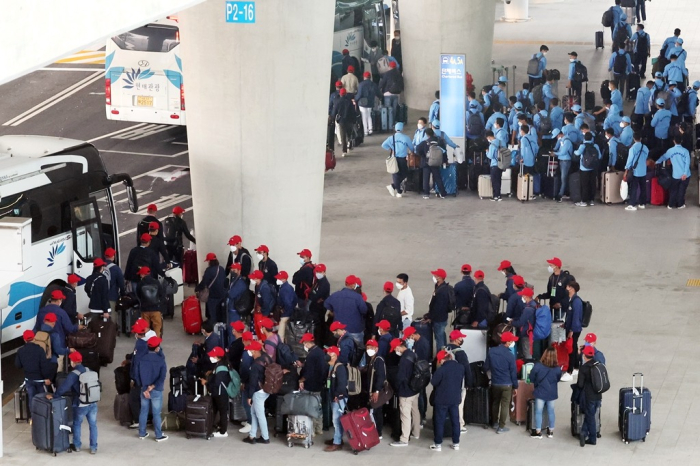Economy
Korea to raise unskilled foreign worker visa quota to record high
The government plans to increase the number of countries eligible for the foreign worker program from the current 16
By Nov 27, 2023 (Gmt+09:00)
3
Min read
Most Read
LG Chem to sell water filter business to Glenwood PE for $692 million


Kyobo Life poised to buy Japan’s SBI Group-owned savings bank


KT&G eyes overseas M&A after rejecting activist fund's offer


StockX in merger talks with Naver’s online reseller Kream


Mirae Asset to be named Korea Post’s core real estate fund operator



South Korea is set to increase its visa quota for non-professional foreign workers to a record high and expand the sectors in which they can work to alleviate chronic labor shortages due to the low birthrate and aging in Asia’s fourth-largest economy.
The government on Monday decided to raise the quota of E-9 visas for unskilled foreign workers by 37.5% to 165,000 next year, the largest since the country started allowing local companies, especially small and medium-sized enterprises, to hire non-professional foreigners in 2004.
The country is allocating 95,000 to the manufacturing sector, 5,000 to the shipbuilding industry, 16,000 to the agricultural sector, 10,000 to the fisheries industry, 6,000 to the construction sector and 13,000 to the service industry.
“The increase in E-9 visa issuances next year is expected to significantly contribute to resolving vacancies in jobs locals avoid,” said Minister of the Office for Government Policy Coordination Bang Ki-sun.
“Related ministries such as the Ministry of Employment and Labor need to seek measures to introduce foreign workers in a timely manner as industries with labor shortages are asking to allow more workers.”
The quota has been growing to 120,000 for this year from 69,000 in 2022 and 52,000 in 2021.
The government is also set to increase the number of countries from which migrant workers are eligible from the current 16. The authorities are considering adding six nations such as India in the expansion, according to the labor ministry.
In September, South Korea decided to raise its visa quota for skilled foreign workers by more than 17 times from the previous level, especially in the shipbuilding and agricultural sectors.
RESTAURANTS
The country plans to expand the industries in which non-professional foreigners can work for from the current agriculture, fisheries, manufacturing, construction and some service sectors.
The government is poised to allow E-9 visa holders to work at Korean restaurants as assistants in dishwashing or food preparation as early as April 2024 as a pilot project in 100 regions including Seoul and Jeju, the country’s top tourist spot.
A restaurant with fewer than five staff is allowed to hire only one foreigner with experience of more than seven years, while that with five or more employees is authorized to recruit up to two with experience of more than five years.
The authorities will consider expanding it through the evaluation of the project while collecting opinions from stakeholders such as customers and employees.
Currently, South Korean nationals, foreigners from 11 countries, including China, holding the H-2 ethnic Korean visa and D-2 student visa holders are allowed to work at restaurants.
The country is also set to permit the forestry and mining industries to hire foreigners from July next year.
NOT YET AT HOTELS
On the other hand, the government has yet to include hotels as an eligible sector to employ non-professional foreign workers due to protests from trade unions.
“It is a unilateral and reckless policy as it does not consider the impact on the domestic labor market, while there was no discussion with trade unions,” said the Federation of Korean Trade Unions, the country’s largest labor body, in a statement.
The federation also said the government has not evaluated the situations of industries with existing permits for foreign workers and taken improvement measures.
The hotel industry strongly protested the government's initial plans to allow hotels in Seoul, Jeju and Gangwon State to employ unskilled foreign workers as cleaners and kitchen assistants.
The country is set to decide if hotels are included next month.
Write to Yong-Hee Kwak at kyh@hankyung.com
Jongwoo Cheon edited this article.
More to Read
-
 PetrochemicalsSaudi Aramco’s $7 bn Korea project mired by labor shortage
PetrochemicalsSaudi Aramco’s $7 bn Korea project mired by labor shortageNov 10, 2023 (Gmt+09:00)
3 Min read -
 Business & PoliticsS.Korea to expand quota of foreign skilled workers to 35,000
Business & PoliticsS.Korea to expand quota of foreign skilled workers to 35,000Sep 25, 2023 (Gmt+09:00)
1 Min read -

-
 EconomyS.Korea to see 240K drop in number of manufacturing workers by 2032
EconomyS.Korea to see 240K drop in number of manufacturing workers by 2032May 10, 2023 (Gmt+09:00)
2 Min read -
 Shipping & ShipbuildingS.Korea launches foreign worker quota exclusively for shipbuilding sector
Shipping & ShipbuildingS.Korea launches foreign worker quota exclusively for shipbuilding sectorApr 25, 2023 (Gmt+09:00)
1 Min read
Comment 0
LOG IN


